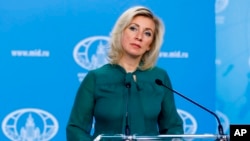Russia took advantage of the assassination attempt on former U.S. President Donald Trump to attack American liberal values, describing what it called a suicide of democracy, and predicting a civil war and the dissolution of the United States.
Kremlin press secretary Dmitry Peskov said U.S. President Joe Biden and the Democratic Party have put Trump’s life in “obvious” danger and provoked his assassination attempt by trying but failing to remove him from the presidential race, “using first legal tools, the courts, prosecutors, attempts to politically discredit and compromise the candidate.”
The FBI said Thomas Matthew Crooks, 20, a resident of Bethel Park, Pennsylvania, was the suspect in the attempted assassination of Trump. Biden said Sunday, the shooting was “contrary to everything we stand for as a nation, everything. It’s not who we are as a nation. It’s not American. And we cannot allow this to happen.”
Contrary to the Kremlin’s claims, the separation of powers concept is not merely a paragraph in the U.S. Constitution but a working system, and President Biden has no control over the judiciary or the legislative branch of the government.
An array of top Russian lawmakers, diplomats and newsmakers pushed a narrative that the attempt on Trump’s life “confirmed” the “American type of democracy” is wrong, and “deeply corroded.”
Russian Foreign Ministry spokesperson Maria Zakharova said the attempt on Trump’s life was all about the American democracy, which “the liberals brought to the verge of suicide.” The “dissolution of the United States does not look like such an impossible prophesy any longer,” Zakharova said.

FILE – Russian Foreign Ministry’s spokeswoman Maria Zakharova speaks to the media in Moscow, Russia, Nov. 2, 2022.
Russia’s state news agency, RIA Novosti, featured the analysis from its top propagandist, Piotr Akopov.
Akopov played around Trump’s 2016 election promise to “drain the Washington swamp” to claim that the “swampers” have been “biting at their elbows” and regretting they “did not kill him before November 2016.”
The Democratic Party did not plot to kill Trump, but the attack was the result of an atmosphere of hatred they have been nurturing for the last eight years, Akopov wrote.
He then speculated that it came as “no surprise” that the Secret Service “only saw the shooter after he made eight shots,” because with Trump’s rising popularity, “killing him has become a scenario with no alternative for the deep state Washington swamp.”
Akopov repeated the conspiracy theory about “killing Trump” being the “only option” five times in his 600-word piece.
While Akopov’s “analysis” is merely a hybrid of propaganda, disinformation and conspiracy theories, he is an essential player in the Kremlin’s domestic messaging. Thousands of local news agencies and websites republish RIA Novosti publications across Russia and the countries of the former Soviet Union in Central Asia and Eastern Europe.
For foreign audiences, Russia utilizes the social media platforms like X, formerly Twitter, and a network of 270+ accounts of the Russian embassies and consulates worldwide, all boosting the Kremlin’s narratives in many different languages.
The Russia Embassy in South Africa is one of the most prominent propaganda superspreaders on X.
To a photograph of Trump’s bloodied face, the diplomatic mission added a commentary accusing the “Democrats” of being incapable of tolerance but capable of perpetrating “any crime… for the sake of their ‘ultimate goal.’”
X users reminded the embassy in South Africa of the death of Alexey Navalny, Russian President Vladimir Putin’s fiercest opponent, in prison earlier this year.
Navalny’s widow, Yulia Navalnaya, and numerous international institutions and governments accused Putin of ordering Navalny’s assassination. Germany and the United Nations Organization for the Prohibition of Chemical Weapons said the Russian FSB poisoned Navalny with military-grade nerve agent Novichok in 2020.
Rights watchdogs say that during the two decades of Putin’s rule, Russia has seen a systematic oppression of political and civil liberties and the erosion of human rights and press freedom.
